Clothing Distribution Programme for Rohingya Refugees
The Centre for Rights and Development (CRD) organized a clothing distribution programme to support displaced Rohingya Muslim refugees in Bangladesh, who lacked proper clothing. The initiative aimed to provide essential garments to those who had no means to purchase them.

CRD coordinated closely with the Deputy Commissioner of Cox’s Bazar, Upazila Nirbahi Officers, Refugee Relief & Repatriation Commissioner, army personnel, and other camp officials to ensure a fair and organized distribution process. Clothing supplies were transported in trucks to the Relief Distribution Control Room and distributed to the camps under strict supervision, with the presence of government representatives, dignitaries, and army personnel.
Despite logistical challenges, including waiting with fully loaded trucks for two days, CRD successfully delivered clothing to hundreds of refugees. The programme provided much-needed relief, helping the Rohingya families maintain dignity and comfort in their daily lives.
Humanitarian Assistance for Cold Wave-Affected Families
The Centre for Rights and Development (CRD), in collaboration with UWT, provided humanitarian support to families affected by severe cold waves in a poverty-stricken region. The area, primarily dependent on agriculture, faces recurrent hardships from floods, cyclones, droughts, and extreme cold. This year, the winter severely affected vulnerable groups, including poor children, elderly women, and men.

CRD conducted a survey with local sub-district staff to identify the most affected families and prepared a priority beneficiary list. Winter clothing—including blankets, sweaters, Punjabi/shirts, saris with trousers, and mufflers—was distributed in the presence of local authorities such as Upazila Chairmen, Upazila Nirbahi Officers, and community elites to ensure fairness and transparency.
This purely humanitarian initiative had a significant impact on the local community, providing relief to those in urgent need and reinforcing trust in CRD’s commitment to supporting vulnerable populations. Despite challenges, the project was successfully completed on time through strong collaboration with local communities and authorities, bringing comfort and hope during harsh winter conditions.
Sustainable Livelihood Projects for Vulnerable Families
The Centre for Rights and Development (CRD), in collaboration with UWT, has been implementing the “Sustainable Livelihood Projects for Vulnerable Families” under income-generating activities (IGAs) in multiple phases. The first phase has already been completed with significant positive impact on the local community.
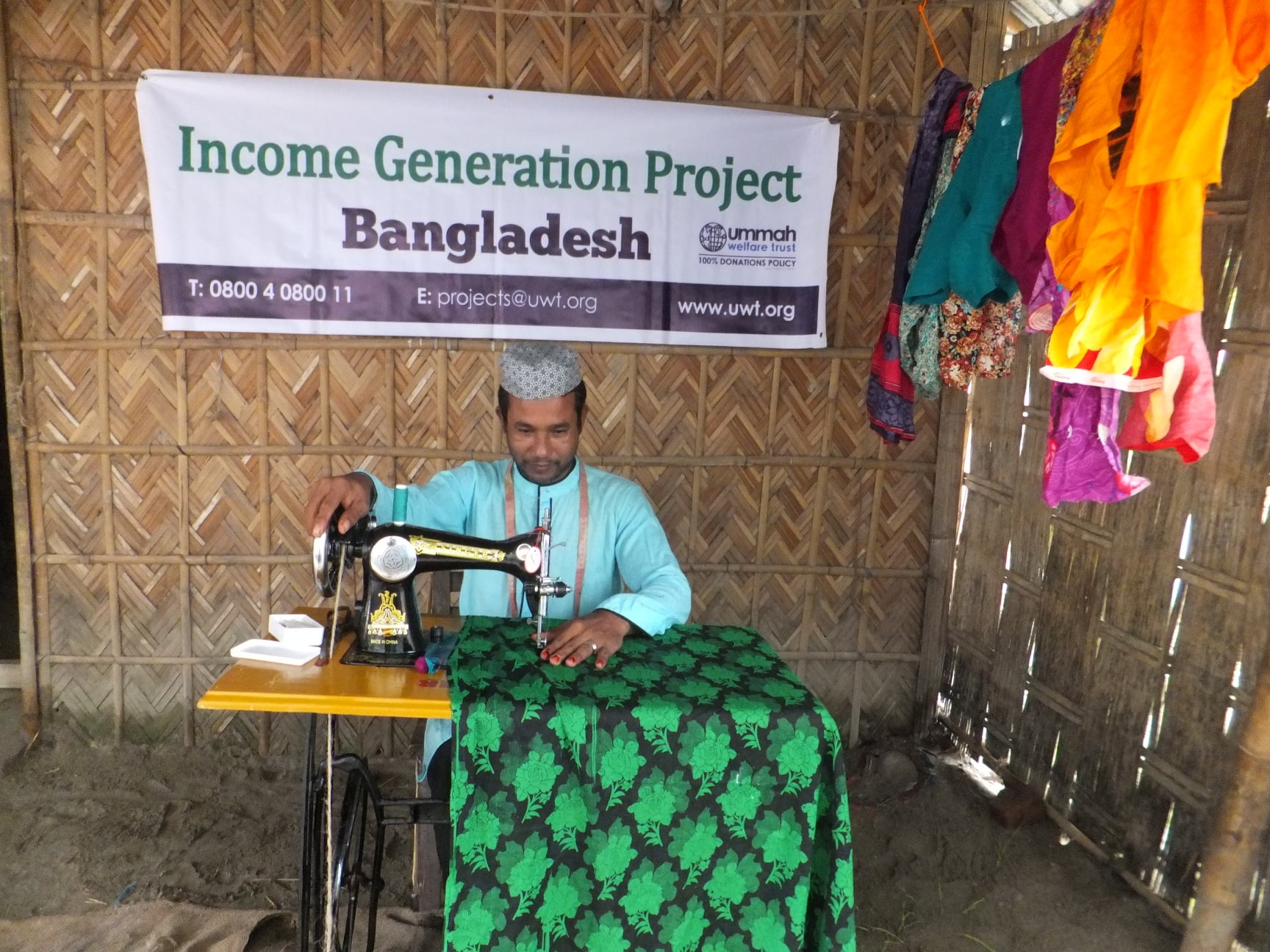
Beneficiary families are now engaged in various activities such as cow rearing, sewing, running small shops, operating rickshaw vans, and managing small hotels. These initiatives have improved household income, reduced dependence, and empowered Muslim families living in distress to achieve economic stability.
The project has garnered appreciation from local administrative bodies and community elites, who are encouraged by the visible progress and tangible benefits for families. By providing sustainable livelihood opportunities, the project is helping vulnerable families stand on their own feet, alleviating poverty and fostering self-reliance. CRD/UWT continues to strive for expanding these initiatives to reach more families in need.
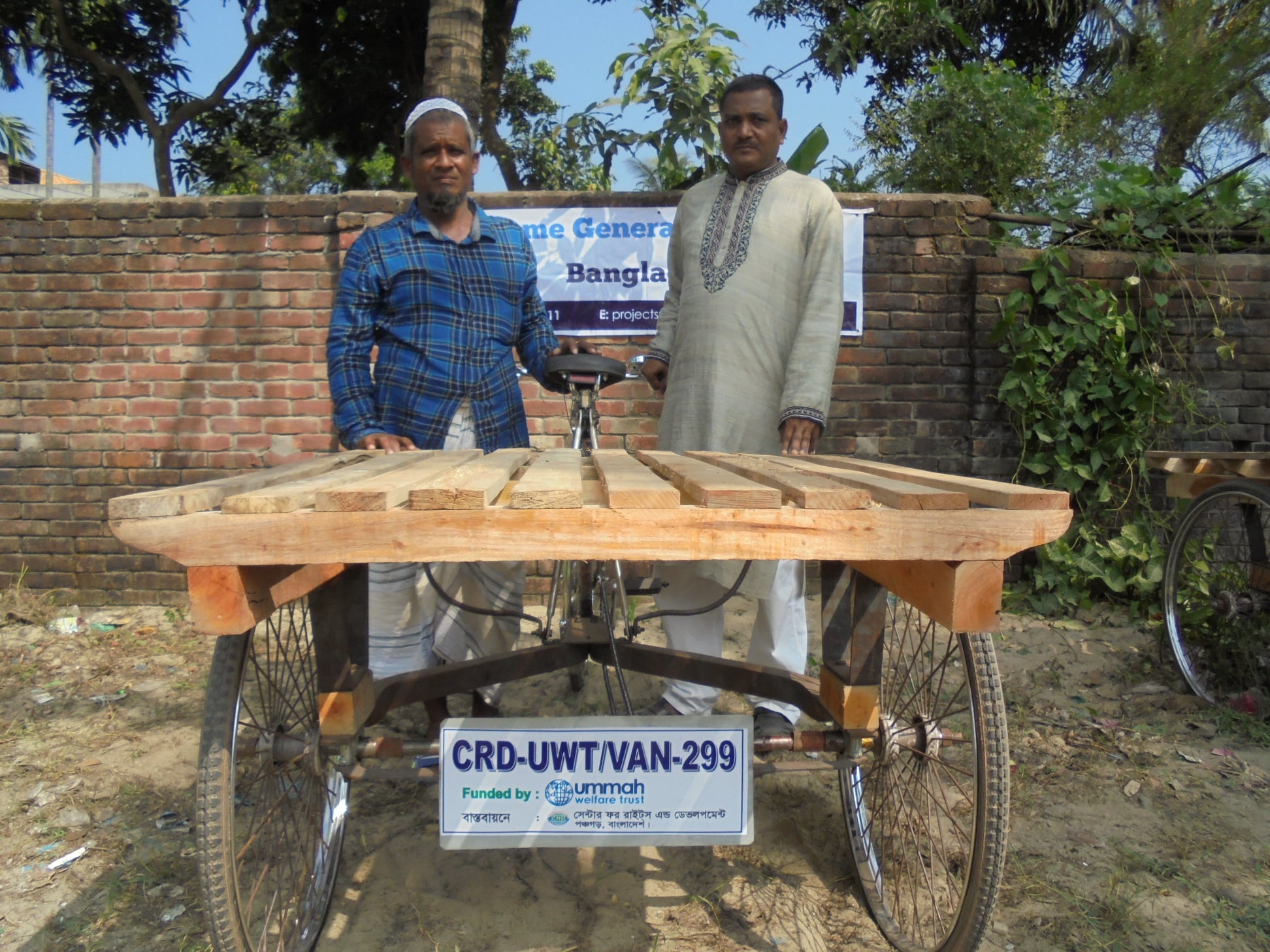
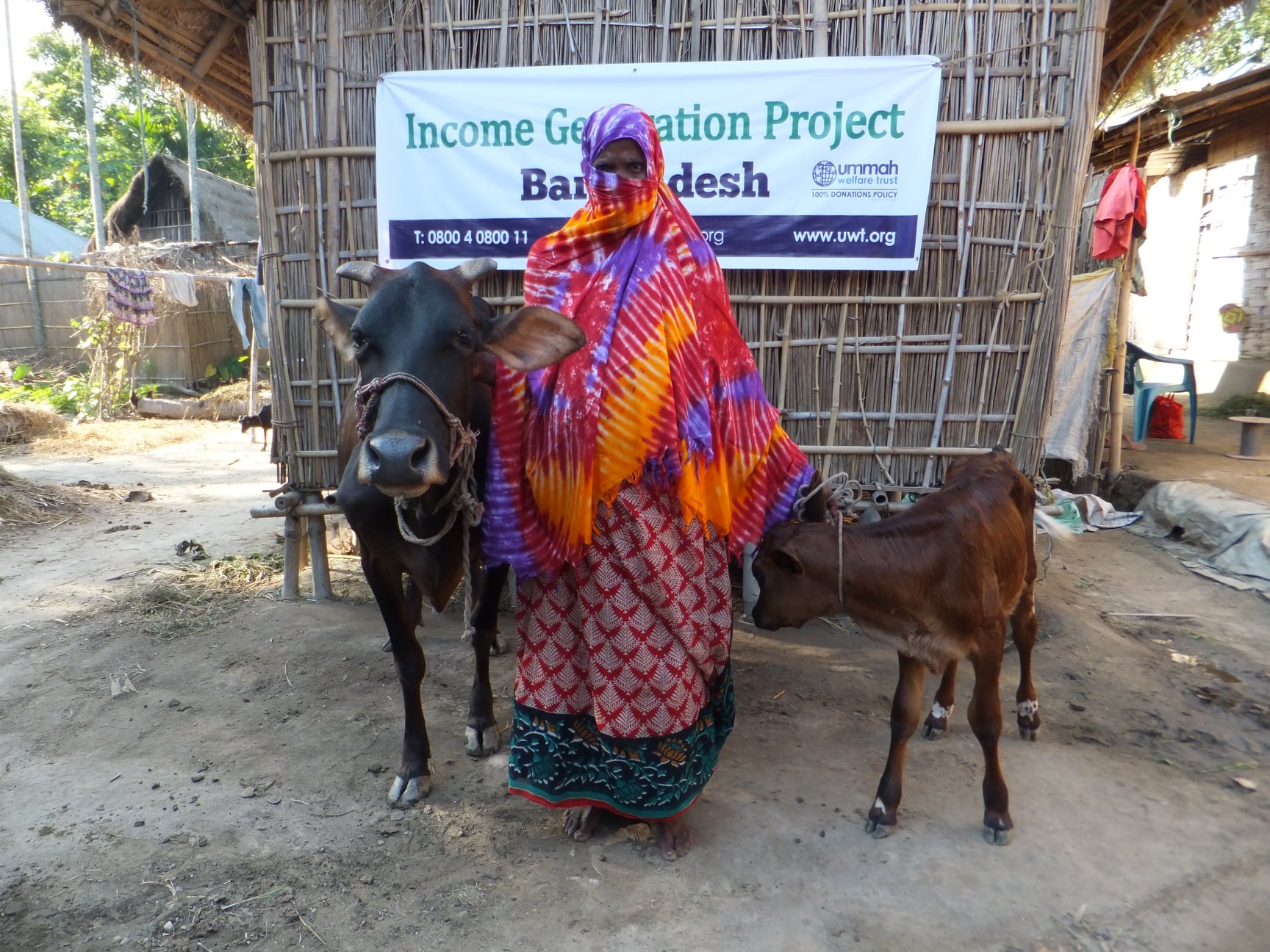
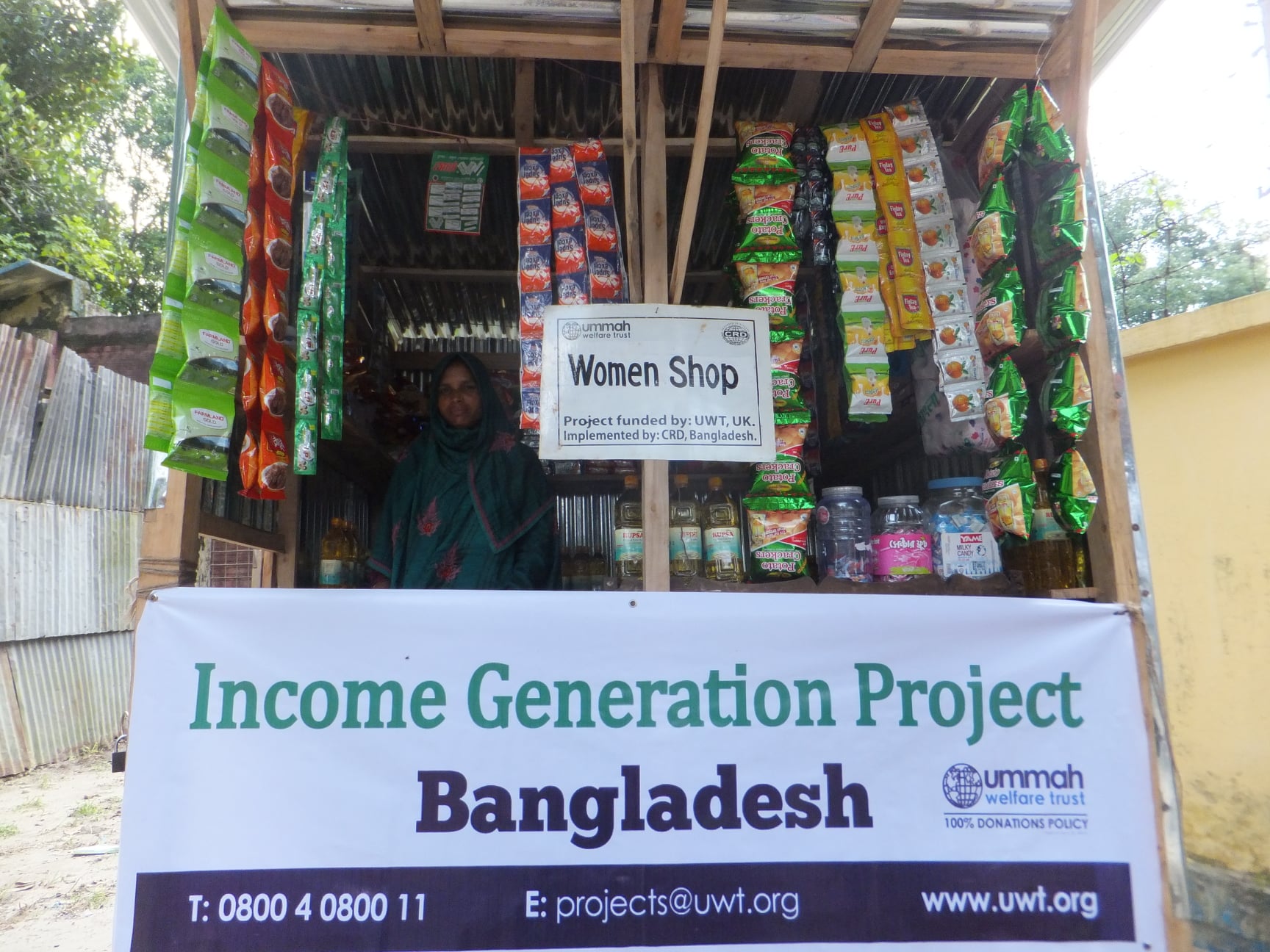
Widow’s Sponsorship Project
The Centre for Rights and Development (CRD), in collaboration with UWT, implemented the Widow’s Sponsorship Project to support vulnerable and dependent widows in target areas. Many of these women had no assets, limited family support, and faced poverty, illness, and social neglect. The project aimed to reduce their dependency and improve their living standards through timely financial allowances.
CRD conducted a survey in coordination with local authorities, including Upazila Chairmen, Upazila Nirbahi Officers, Union Chairmen, and community elites, to prepare a verified list of widows in need. Allowances were then distributed directly to 615 widows in selected areas, under strict supervision, ensuring transparency and fairness.

This initiative significantly benefited the local community by enabling widows to meet their basic needs, access medical treatment, and maintain their sustenance level. The project has been widely appreciated by local administrators and community members, who encouraged CRD/UWT to continue such support for socially neglected women. CRD staff also maintained regular follow-up to ensure the project genuinely improved the lives of the beneficiaries.
Installation of Hand Pumps in Rural Areas
The Centre for Rights and Development (CRD), in collaboration with UWT, implemented a project to provide clean water to rural communities in Bangladesh by installing hand pumps in areas with acute water shortages. Following approval from the NGO Affairs Bureau, CRD conducted surveys in coordination with Upazila and Union authorities to identify suitable locations for installation. Hand Pump Management Committees were formed, and caretakers were deployed to ensure proper maintenance.
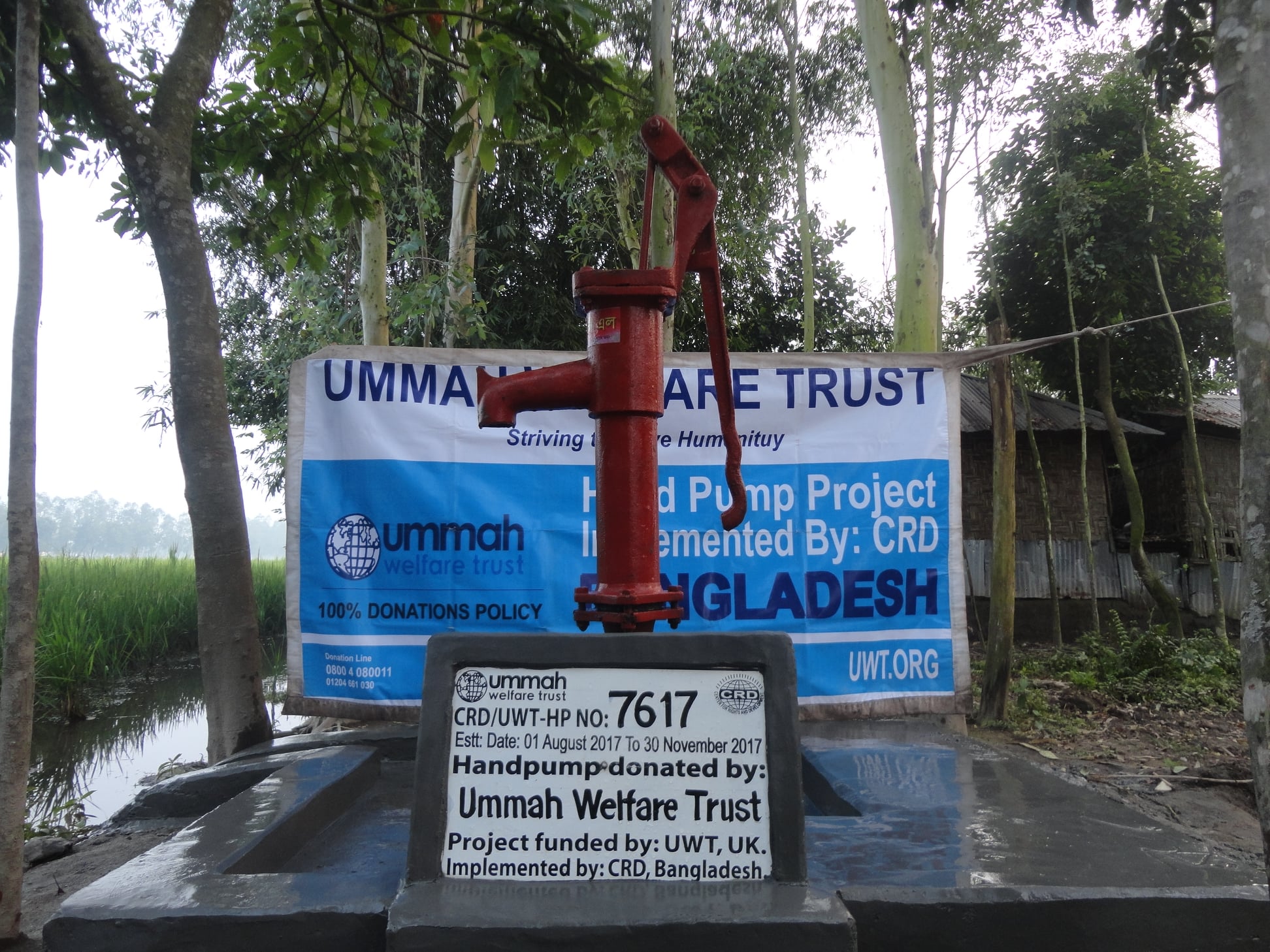
In the first phase, CRD installed 825 hand pumps, benefiting over 70,000 people, including men, women, and children. Of these, 35 pumps were installed in madrasa premises, 52 in mosque premises, 31 in schools, 677 in villages, 4 in marketplaces, 14 in community clinics, 8 in graveyards, 1 in a college, and 1 in the Union Parishad area. Each hand pump bears the name of the donor, ensuring transparency and recognition.
These hand pumps have significantly improved access to clean water, reducing the risk of waterborne diseases such as diarrhea and dysentery. The project has empowered communities that previously lacked the means to install such facilities, providing a vital resource for health, hygiene, and daily sustenance.
Qurbani Project
CRD, in collaboration with UWT, organized the Qurbani Project to support vulnerable communities by distributing sacrificial meat during Eid. The project involved careful planning, coordination with local authorities, and the establishment of designated distribution spots. The initiative ensured that the Qurbani process was carried out in an organized, fair, and transparent manner. Through this project, CRD provided essential support to families in need, reflecting its ongoing commitment to humanitarian assistance and community welfare.

Orphan Sponsorship Project
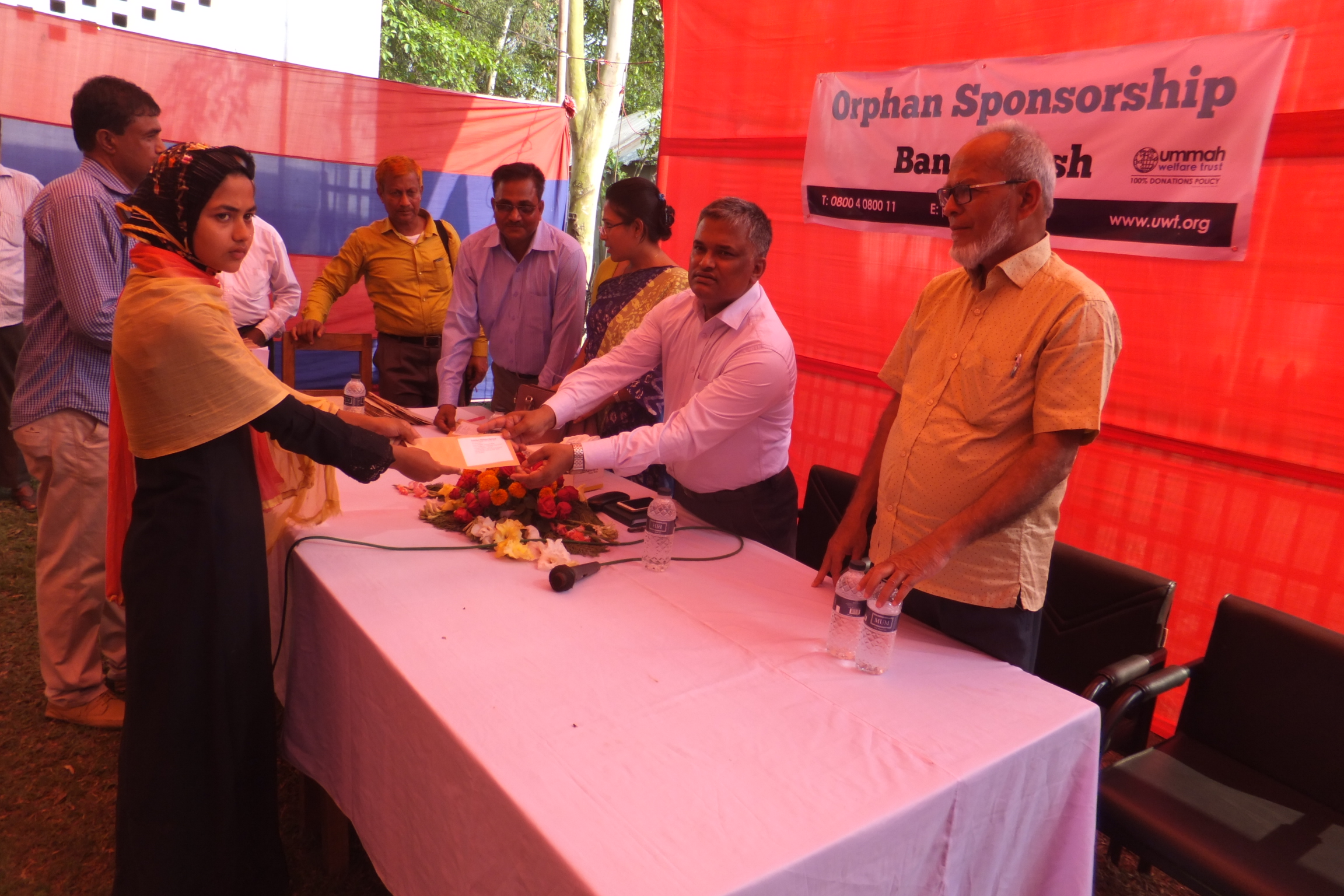 CRD, in collaboration with UWT, implemented the Orphan Sponsorship Project to support vulnerable children who have lost parental care and are neglected in society. The project focuses on providing guidance, education, and essential support to help orphan children grow, learn, and develop their skills and values.
CRD, in collaboration with UWT, implemented the Orphan Sponsorship Project to support vulnerable children who have lost parental care and are neglected in society. The project focuses on providing guidance, education, and essential support to help orphan children grow, learn, and develop their skills and values.
The initiative involved close coordination with local authorities and community members to identify children in need and ensure proper management of sponsorship funds. CRD staff regularly monitored the children’s progress, collaborated with teachers and guardians, and maintained strict supervision to ensure the well-being and positive development of the orphans.
Through this project, CRD has been helping orphan children gain access to education, develop life skills, and build a foundation to stand on their own feet in the future. The project reflects CRD’s commitment to creating a supportive environment for vulnerable children and fostering a better future for them.
Cooking Fuel/Fuel Logs/Rice Husk Supply for Rohingya Refugees
CRD, in collaboration with UWT, implemented a project to supply cooking fuel, fuel logs, and rice husk to forcibly displaced Rohingya Muslim refugees in Bangladesh. These refugees, who fled violence and persecution in Myanmar’s Rakhine State, face daily hardships, including scarcity of essential resources for preparing meals.

The project involved careful coordination with local authorities, including the Deputy Commissioner, Upazila Nirbahi Officers, Camp In-charges, and army personnel to ensure a smooth and organized distribution process. Fuel logs and rice husk were distributed in the refugee camps under proper supervision, ensuring that the displaced families could prepare their meals without facing shortages.
Solar Street Lamps for Rohingya Refugee Camps
CRD, in collaboration with UWT, implemented a project to install solar street lamps in Rohingya refugee camps in Cox’s Bazar, Bangladesh. The objective was to provide safe and reliable lighting so that camp residents could move freely at night and feel secure.
The project involved close coordination with local authorities, including the Deputy Commissioner, Upazila Nirbahi Officers, Refugee Relief & Repatriation Commissioner, Camp In-charges, and army personnel. After conducting need assessments and obtaining necessary approvals, the solar street lamps were installed under direct supervision of the relevant authorities.

The installation of the lamps significantly improved safety and mobility within the camps, providing comfort and peace of mind to the refugees. This initiative demonstrates CRD’s commitment to enhancing living conditions and ensuring the security of displaced communities.
CRD staff regularly monitored and oversaw the distribution to ensure the project was implemented efficiently and fairly. This initiative reflects CRD’s commitment to providing essential humanitarian support and improving the living conditions of refugees in emergency situations.
Mosque and Madrasa Repair and Construction Work

CRD has carried out repair and construction work in local mosques and madrasas to improve their infrastructure and facilities. These activities included repairing damaged structures, strengthening walls, renovating roofs, and ensuring safe and comfortable spaces for students and worshippers. The initiative aimed to create a conducive environment for learning and religious activities, reflecting CRD’s commitment to supporting community development and enhancing local educational and spiritual institutions.
Shelter Construction for Vulnerable Widows and Abandoned Women
 CRD has constructed small homes to support vulnerable widows and abandoned women living in poverty. Each home includes three rooms: one equipped with electricity, two living spaces, and a kitchen, designed to provide safe and dignified shelter. These homes aim to improve the living conditions of the women, offering them security, privacy, and a foundation to rebuild their lives with confidence and self-reliance.
CRD has constructed small homes to support vulnerable widows and abandoned women living in poverty. Each home includes three rooms: one equipped with electricity, two living spaces, and a kitchen, designed to provide safe and dignified shelter. These homes aim to improve the living conditions of the women, offering them security, privacy, and a foundation to rebuild their lives with confidence and self-reliance.
Food Assistance for Rohingya Refugees

CRD provided immediate food assistance to Rohingya refugees upon their arrival in Cox’s Bazar. The initiative aimed to meet their urgent nutritional needs, ensuring that families, children, and vulnerable individuals had access to essential meals during their first days in the camps. This effort reflects CRD’s commitment to providing timely humanitarian relief in emergency situations.
Shelter Construction for Rohingya Refugees

CRD also constructed temporary shelters in the Rohingya camps to provide safe and secure living spaces for newly arrived refugees. These shelters offered protection from harsh weather and created a secure environment for families to settle and regain a sense of stability during a time of displacement and uncertainty.
Food Distribution for Flood-Affected Communities
CRD provided food assistance to communities affected by floods, ensuring that families in disaster-hit areas received essential nutrition during difficult times. The initiative focused on delivering emergency relief in a timely and organized manner, helping vulnerable households meet their immediate food needs and cope with the impact of flooding.
Preventing Domestic Violence
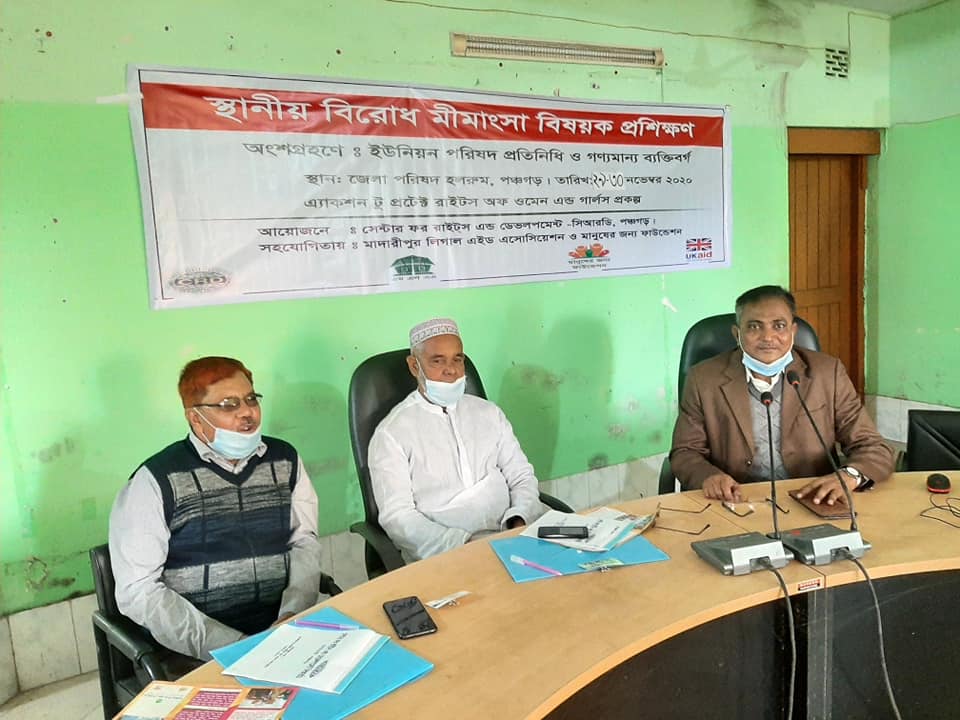
CRD, with support from the foundation, has been working extensively to prevent domestic violence and protect vulnerable individuals. The initiative focuses on raising awareness, providing guidance and support to affected families, and empowering community members to recognize, prevent, and address cases of domestic abuse. Through long-term engagement, the project aims to create safer and more supportive environments for women, children, and other at-risk groups.
Collaboration with Switch Development Agency
CRD has worked closely with Switch Development Agency to implement a range of community development programs aimed at improving the lives of vulnerable and marginalized populations. This collaboration focused on multiple sectors, including livelihood enhancement, education, infrastructure development, and capacity building for local communities.
Through this partnership, CRD engaged in empowering community members by providing them with access to training, knowledge, and resources that promote self-reliance and sustainable development. Special attention was given to the needs of women, children, and other vulnerable groups to ensure inclusivity and equity in all initiatives.
The programs under this collaboration also emphasized community participation, awareness-raising campaigns, and local capacity development. Activities included workshops, field visits, and monitoring to ensure that development interventions were effectively reaching the target communities and creating tangible positive impact.
By working with Switch Development Agency, CRD has been able to strengthen its efforts in fostering sustainable livelihoods, improving local infrastructure, and promoting social development, thereby contributing to the overall well-being and resilience of the communities it serves.
Enhancing Opportunities for Rural Justice and Introducing Human Rights Education Project
CRD, with the support of Manusher Jonno Foundation and in collaboration with Madaripur Legal Aid Association, implemented this project to strengthen rural justice and promote human rights education. The initiative focused on increasing awareness of legal rights among marginalized rural communities and improving access to justice. Through workshops, training sessions, and community outreach, the project empowered individuals to understand and claim their rights, contributing to stronger and more equitable local justice systems.
Action to Protect Rights of Women & Girls Project
This project, implemented by CRD with the support of Manusher Jonno Foundation and Madaripur Legal Aid Association, focused on protecting and promoting the rights of women and girls. The initiative included awareness campaigns, capacity-building programs, and community engagement activities to empower women, ensure their social safety, and reduce vulnerabilities. By addressing gender-based challenges and fostering an environment of equality and respect, the project aimed to create lasting positive change in the lives of women and girls in the target communities.
Goat Distribution Program for Livelihood Support
CRD, with the support of Bangladesh NGO Foundation, has been implementing a long-term Goat Distribution Program aimed at promoting self-employment and sustainable livelihoods for poor and vulnerable people. Since 2005, this initiative has focused on empowering families by providing them with goats, enabling them to generate income, improve food security, and enhance their overall well-being. Through this ongoing program, CRD continues to support communities in building sustainable sources of livelihood and reducing poverty.
Human Rights Training and Awareness Programs
CRD, with the financial support of Bangladesh NGO Foundation, has been implementing comprehensive Human Rights Training and Awareness Programs. These initiatives aim to educate communities about their fundamental rights, promote human rights awareness, and empower individuals to advocate for justice and equality. Through workshops, seminars, and community outreach activities, CRD continues to strengthen knowledge and understanding of human rights, contributing to a more informed and equitable society.
Non-Formal Education and Multipurpose Centers
In 2005, CRD, with the support of ILO (International Labour Organization), implemented Non-Formal Education and Multipurpose Centers. These initiatives aimed to provide educational opportunities to out-of-school children and marginalized groups, promoting skills development and lifelong learning. The centers also served as community hubs for various developmental activities, contributing to the empowerment and social advancement of the local population.
Child Labour Prevention and Protection Project
Between 2000 and 2011, CRD, with the support of Manusher Jonno Foundation, implemented a three-year project aimed at preventing extreme child labour and protecting children from hazardous work. The initiative focused on raising awareness, advocating for child rights, and mobilizing communities to eliminate exploitative child labour practices. Through campaigns, workshops, and community engagement, CRD actively contributed to safeguarding children and promoting their education, safety, and overall well-being.
Ramjanpur Eid Gift Project
From 2010 to 2020, CRD implemented the Ramjanpur Eid Gift Project, aimed at providing gifts and essential items to underprivileged children, women, and families during the festive season of Eid. The project focused on spreading joy, promoting social solidarity, and supporting vulnerable communities by ensuring they could celebrate Eid with dignity and happiness. Through this initiative, CRD fostered community engagement and brought festive relief to those in need.

